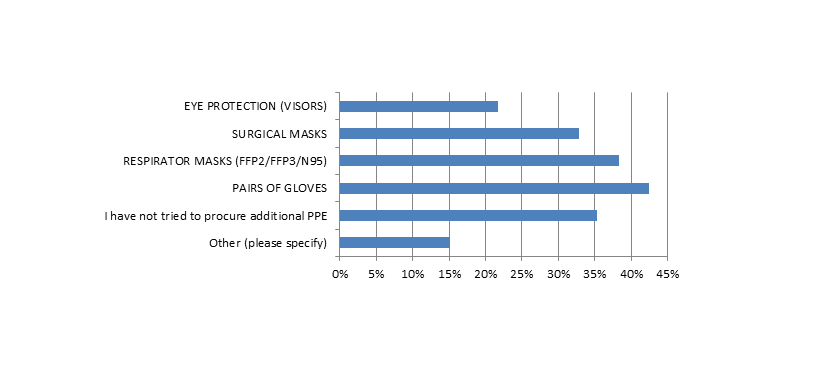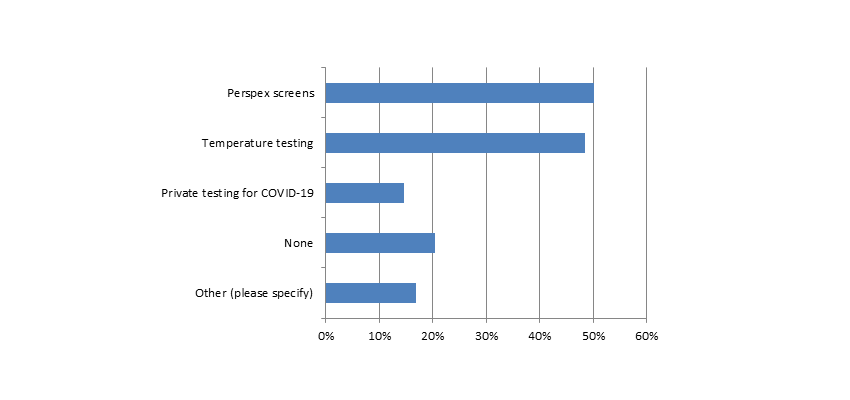Reporting on business requirements, supply difficulties and anticipated additional demand for PPE.
Headline findings
- Businesses reported facing difficulty accessing most forms of PPE. But supply issues were particularly acute for pairs of gloves (cited by 42% of respondents) and respirator masks (38%)
- An overwhelming proportion of businesses (79%) anticipate additional PPE needs for their business, once “normal” operations resume
- From the survey data, we expect additional demand across UK businesses could be as high as an extra 10 million pairs of gloves and 3 million surgical masks per week
- Firms are also considering alternative ways of managing the health of their employees. Most notably, the use of Perspex screens and temperature testing were each cited by half of respondents.
Why did we run this survey?
We wanted to canvass the business community on their PPE needs before the coronavirus crisis and their anticipated needs as we emerge from it. We also wanted to quantify some of the anecdotal feedback on business access to PPE.
Who responded?
The survey was conducted between 7 May and 15 May 2020. There were 243 respondents across all business sectors, sizes and regions of the UK.
What was the current operating status of the businesses surveyed?
The overwhelming majority described themselves as partially open while observing social distancing (58%). Only 15% described themselves as completely open while observing social distancing. Almost a fifth of businesses (19%) were completely closed.
Do these businesses use PPE in their usual business activity?
Over half of respondents (54%) reported the use of PPE as part of ‘business as usual’ activity.
Respondents described the broad array of PPE including reusable gloves, protective boots, overalls for COSHH, eye protection including safety glasses, dust masks, harnesses, snoods, sanitising wipes, ear defenders, hard hats and disposable aprons.
Of the items we surveyed, the highest weekly demand was for gloves, followed by respirators.
Have businesses faced any difficulties over the last six weeks in accessing the following supplies of PPE necessary for current business activity?
Businesses reported facing difficulty accessing most forms of PPE. But supply issues were particularly acute for pairs of gloves (cited by 42% of respondents) and respirator masks (38%).

Within ‘other’ forms of PPE, businesses cited difficulty accessing a range of items including hand sanitiser; anti-bacterial cleaning fluid; fluid repellent single use long sleeve gowns; sterile surgical gowns; anti-bacterial wipes; plastic aprons; over coats for food production; coveralls; disposable fluid barrier aprons and eye-protection safety glasses.
Respondents also expressed concern over the price of PPE, and that sourcing will become more problematic if there is a demand surge as we come out of lockdown.
There were also observations on the ease of utility. For example, one respondent sourced FFP2 masks from outside the UK that were foldable rather than the usual cup-type masks with an exhalation valve - these not being as comfortable as the latter version. Others observed that it’s taking longer to get deliveries even once PPE is sourced.
Do businesses anticipate additional needs for PPE once the government lifts social distancing measures, and “normal” operations resume?
An overwhelming proportion of businesses (79%) anticipate additional PPE needs for their business once “normal” operations resume.
In which areas of PPE do businesses anticipate additional need?
Businesses are expecting increased demand for all types of PPE, with almost three-quarters of respondents anticipating increased demand for surgical masks and surgical gloves.

Some of the comments referenced the need to reflect the latest government guidance and conduct risk assessments together with an appreciation of evolving public and employee expectations in relation to PPE. A potential need for protective screens, sanitiser, masks, gowns visors and aprons were all also mentioned.
Do businesses anticipate implementing any other measures to manage employee health at work?
Firms are also considering alternative ways of managing employee health. Most notably, the use of Perspex screens and temperature testing were each cited by half of respondents.

Within ‘other’, the areas mentioned reflect the diverse ways in which individual businesses are seeking to manage employee health, including:
- Amending access flow of building and movement
- Implementing social distancing measures
- Reduction of canteen facilities
- Shift work, working from home, additional hand washing facilities and hand sanitisers
- Considering the safety of employees travelling to and from work
- Providing face cloths to all employees to use outside of work/on route to work.
- Employee training and education
- A recognition that PPE implementation will be based on government advice, customer expectation and employee sentiment as well as health and safety considerations
- An awareness of ongoing risk assessments as key.
Quantifying the future demand for PPE
Respondents provided weekly unit estimates for PPE before the crisis and their expectations as their businesses emerge from lockdown.
There is a very clear signal of a big demand uplift for pairs of gloves and surgical masks. In contrast, only a modest demand increase for eye protection (visors) is expected, and very little change in business demand for respirator masks.
From the survey data, we expect additional demand across UK businesses could be as high as an extra 10 million pairs of gloves and 3 million surgical masks per week. For context, before coronavirus our respondents were reporting a weekly requirement of over 212,000 pairs of gloves and almost 9,000 surgical masks a week.
As a result, the survey data points to a significant rise in PPE needs as businesses reopen. It’s likely to be an area of ongoing supply chain challenge for some time and carries with it the risk of price inflation if demand cannot be met.










